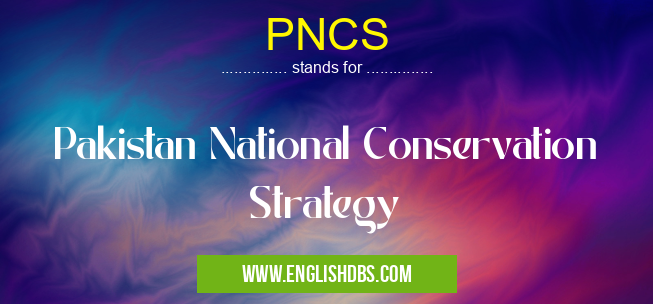What does PNCS mean in CONSERVATION
Pakistan National Conservation Strategy (PNCS) is a comprehensive framework developed by the Government of Pakistan to promote sustainable development and environmental conservation in the country.

PNCS meaning in Conservation in Community
PNCS mostly used in an acronym Conservation in Category Community that means Pakistan National Conservation Strategy
Shorthand: PNCS,
Full Form: Pakistan National Conservation Strategy
For more information of "Pakistan National Conservation Strategy", see the section below.
Key Points
- Purpose: To integrate environmental considerations into national planning and decision-making processes.
- Adoption: Approved by the Government of Pakistan in 1992.
- Goals:
- Protect and restore natural resources.
- Promote sustainable land and water use.
- Conserve biodiversity.
- Mitigate pollution and climate change.
- Objectives:
- Establish a framework for environmental assessment and monitoring.
- Promote environmental education and awareness.
- Develop and implement conservation policies and programs.
- Principles:
- Intergenerational equity: Ensuring the well-being of future generations.
- Precautionary principle: Taking preventive measures in the face of uncertainty.
- Polluter pays principle: Holding those responsible for environmental damage accountable.
- Implementation:
- Coordinated efforts among government agencies, NGOs, and communities.
- Regular monitoring and evaluation to assess progress.
Essential Questions and Answers on Pakistan National Conservation Strategy in "COMMUNITY»CONSERVATION"
What is the Pakistan National Conservation Strategy (PNCS)?
The Pakistan National Conservation Strategy (PNCS) is a comprehensive framework that outlines the country's approach to environmental conservation and sustainable development. It was developed in the 1980s and adopted by the Government of Pakistan in 1992.
What are the goals of the PNCS?
The PNCS has three primary goals:
- To protect and conserve Pakistan's natural resources, including its forests, wildlife, and water resources.
- To promote sustainable development that meets the needs of the present generation without compromising the ability of future generations to meet their own needs.
- To ensure that the benefits of conservation and sustainable development are shared equitably among all citizens of Pakistan.
How does the PNCS work?
The PNCS is implemented through a variety of mechanisms, including:
- Government policies and regulations
- Public awareness campaigns
- Educational programs
- Research and development initiatives
- Partnerships with non-governmental organizations (NGOs) and the private sector
What are the key achievements of the PNCS?
The PNCS has helped Pakistan achieve several notable successes, including:
- The establishment of a national park system
- The protection of endangered species
- The promotion of sustainable agriculture practices
- The development of renewable energy sources
- The reduction of air and water pollution
What challenges does the PNCS face?
The PNCS faces several challenges, including:
- Poverty and lack of resources
- Climate change
- Population growth
- Deforestation
- Water scarcity
What is the future of the PNCS?
The PNCS is an ongoing process that will continue to evolve to meet the changing needs of Pakistan. The government is committed to implementing the PNCS and achieving its goals for environmental conservation and sustainable development.
Final Words: PNCS serves as a roadmap for Pakistan's sustainable development journey. It promotes a balance between economic growth and environmental protection, ensuring the preservation of natural resources for present and future generations.
